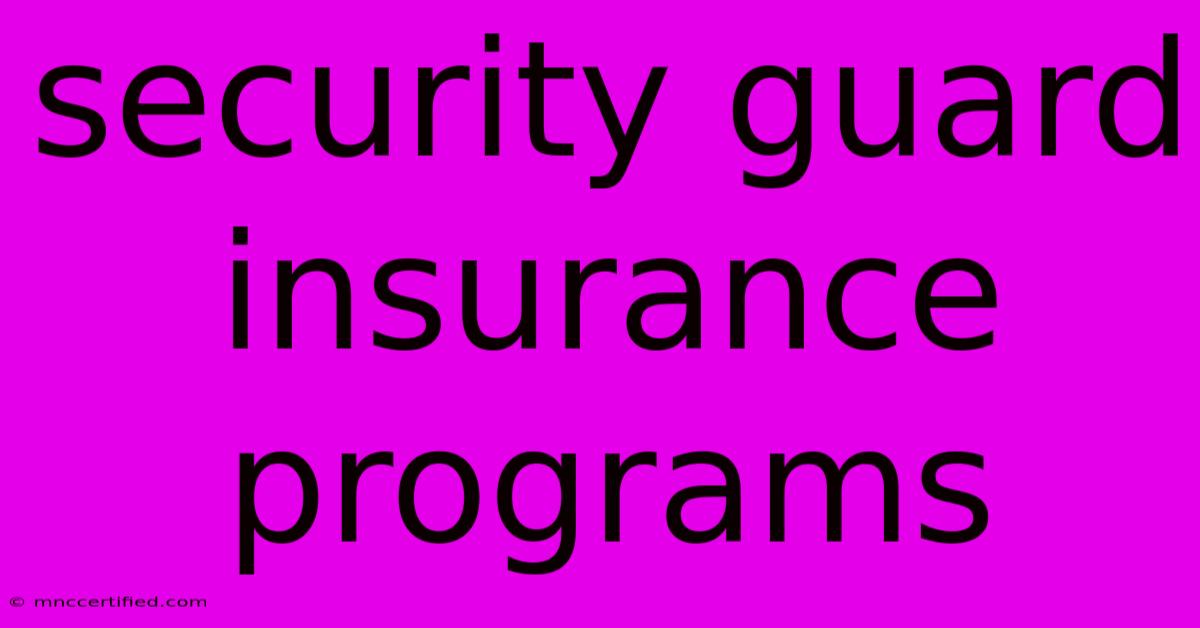Security Guard Insurance Programs

Table of Contents
Security Guard Insurance Programs: Protecting Your Business and Personnel
The security industry plays a vital role in protecting lives and property. However, it's also a high-risk profession, exposing security guards and employing businesses to potential liabilities. That's where comprehensive security guard insurance programs become crucial. This article will delve into the various types of insurance essential for security guard companies and individual guards, highlighting the importance of adequate coverage and offering guidance on selecting the right program.
Why Security Guard Insurance is Non-Negotiable
Security guards face numerous risks daily, from physical altercations and property damage to accusations of negligence or wrongful actions. Without proper insurance, these risks translate directly into significant financial burdens. A single lawsuit could bankrupt a small security company or leave an individual guard facing crippling debt. Therefore, investing in the right insurance program is not just a good idea – it's a necessity for financial protection and business sustainability.
Key Risks Requiring Insurance Coverage:
- General Liability Insurance: This covers bodily injury or property damage caused by your security guards while on duty. This is arguably the most important policy for any security company. It protects against claims arising from accidents, slips, falls, or even alleged negligence.
- Workers' Compensation Insurance: This is a legal requirement in most jurisdictions. It covers medical expenses and lost wages for security guards injured on the job, regardless of fault. Failing to have this coverage can result in severe penalties.
- Professional Liability Insurance (Errors and Omissions Insurance): This protects against claims of negligence or errors in judgment made by your security guards. For example, failing to prevent a crime or making a wrongful arrest could lead to costly lawsuits.
- Umbrella Liability Insurance: This provides additional liability coverage above and beyond your general liability and professional liability policies. It acts as a safety net for catastrophic events.
- Commercial Auto Insurance: If your security guards use company vehicles, you need commercial auto insurance to cover accidents involving those vehicles. This is essential for both liability and property damage.
Choosing the Right Security Guard Insurance Program: Key Considerations
Selecting the right insurance program requires careful consideration of several factors:
- The size of your business: A large security firm will have different insurance needs than a solo operator.
- The types of services provided: Specialized services like executive protection or armed security may require additional or specialized coverage.
- Your geographical location: Insurance rates and requirements vary by state and region.
- Your budget: While comprehensive coverage is essential, finding a balance between adequate protection and affordability is crucial.
- The reputation and financial stability of the insurance provider: Choose a reputable insurer with a proven track record of paying claims fairly and promptly.
Finding the Best Security Guard Insurance Provider
Researching and comparing quotes from multiple insurers is crucial to secure the best coverage at the most competitive price. Don't hesitate to ask detailed questions about policy exclusions and coverage limits. Look for providers specializing in the security industry; they'll understand your specific needs and risks better.
Beyond Insurance: Risk Management Strategies
Insurance is a crucial element, but it shouldn't be the sole strategy for managing risk. Proactive risk management measures are essential to minimize incidents and reduce the likelihood of claims.
- Thorough background checks: Employing trustworthy and well-trained personnel reduces the risk of negligent acts.
- Comprehensive training: Equipping your guards with the necessary skills and knowledge minimizes errors and improves their ability to handle challenging situations.
- Clear policies and procedures: Establish written procedures for handling various situations and ensure your guards understand and follow them.
- Regular safety inspections: Conduct regular safety inspections of work sites to identify and address potential hazards.
Conclusion: Protecting Your Investment
Security guard insurance programs are not just a cost of doing business; they are a vital investment in the future of your company and the well-being of your employees. By understanding the different types of insurance available, carefully assessing your risks, and implementing effective risk management strategies, you can protect yourself, your business, and your security guards from the potentially devastating financial consequences of accidents and lawsuits. Remember to actively seek professional advice to ensure you have the appropriate coverage in place.

Thank you for visiting our website wich cover about Security Guard Insurance Programs. We hope the information provided has been useful to you. Feel free to contact us if you have any questions or need further assistance. See you next time and dont miss to bookmark.
Featured Posts
-
Cardona Travel And Insurance Agency
Nov 19, 2024
-
Swift Stunned By Bills Fans Reaction
Nov 19, 2024
-
Laon Watch News Tavares In Portugal
Nov 19, 2024
-
Dental Insurance Billing Training
Nov 19, 2024
-
Cancelo On Saudi Football Honest Talk
Nov 19, 2024